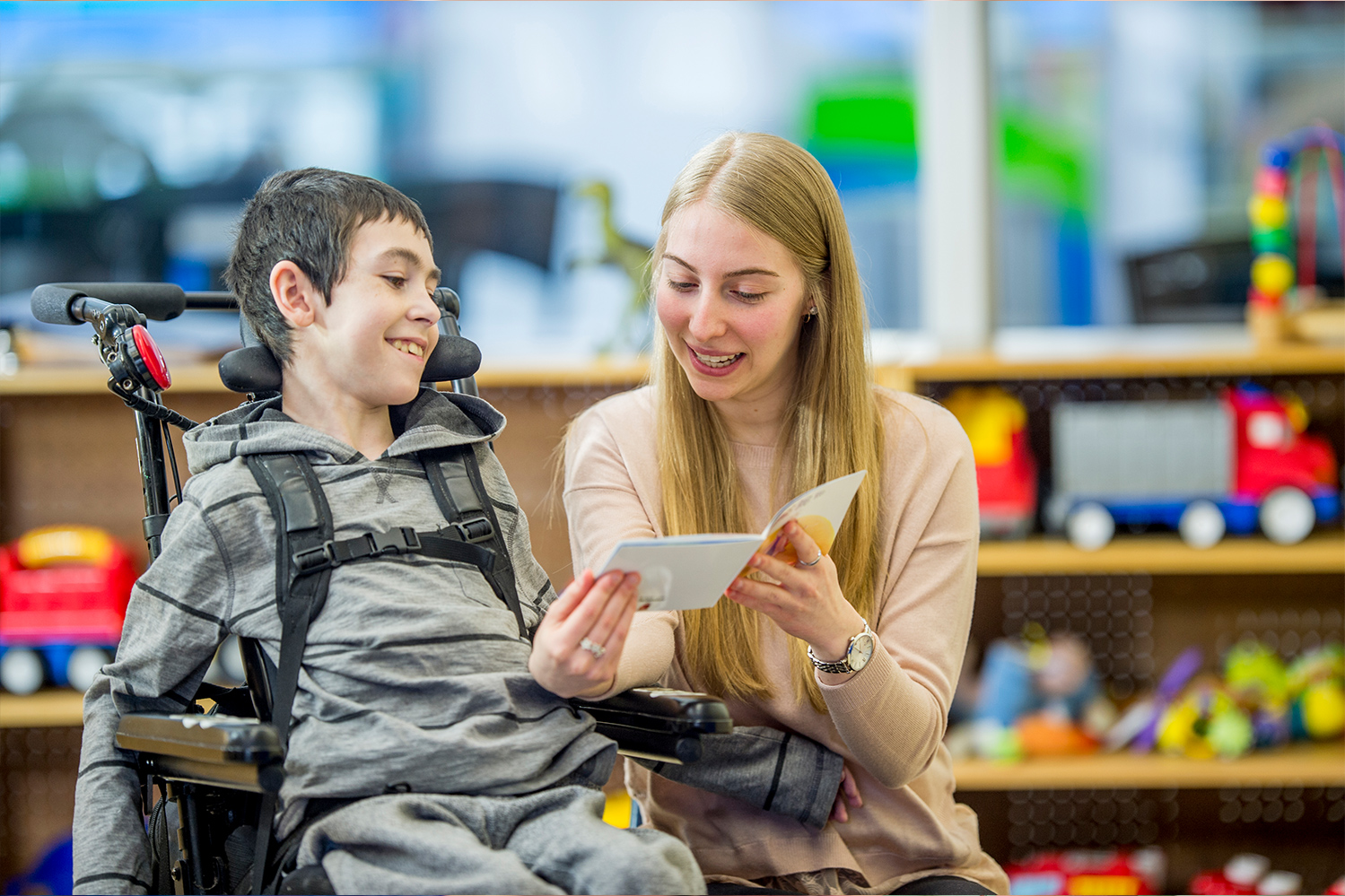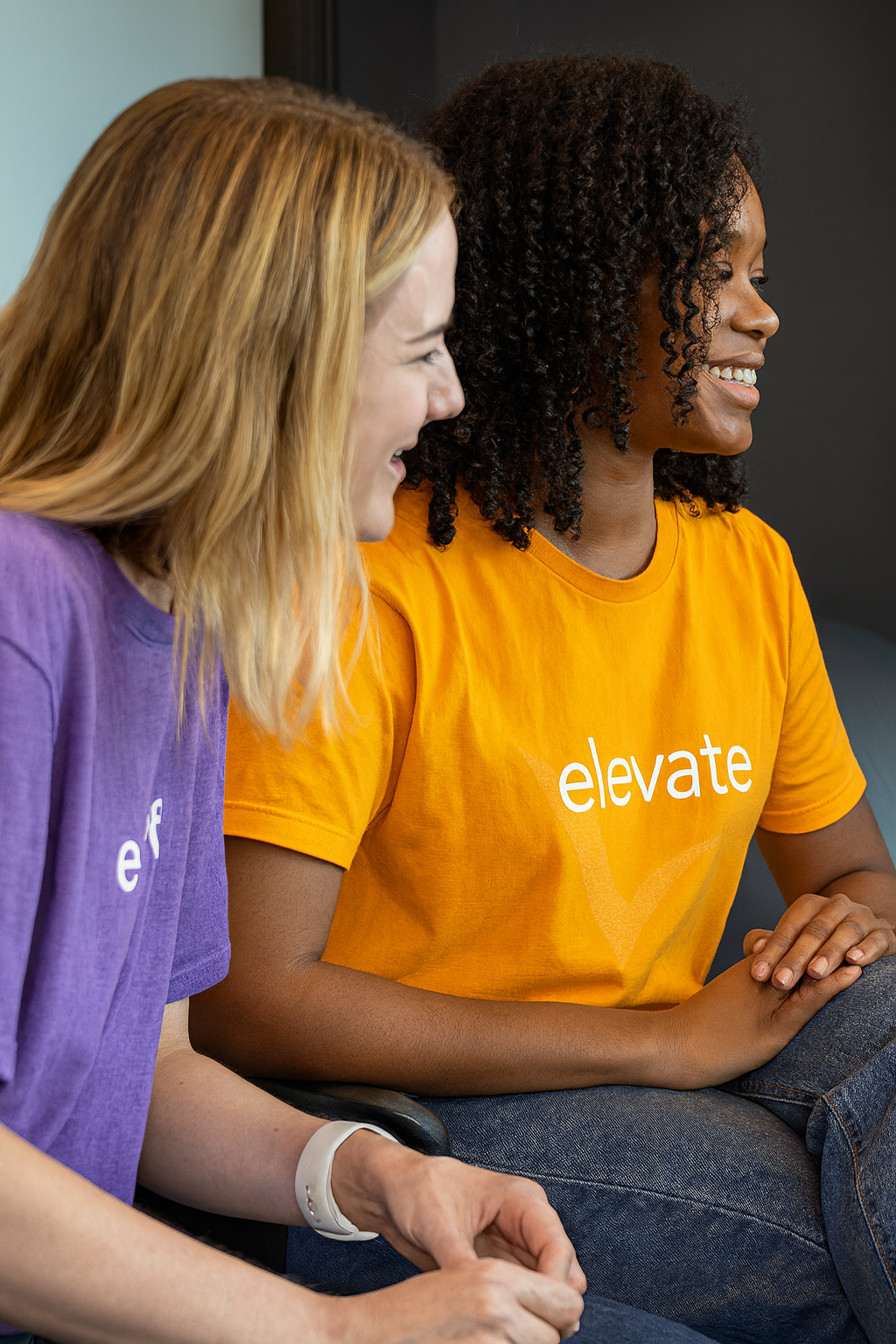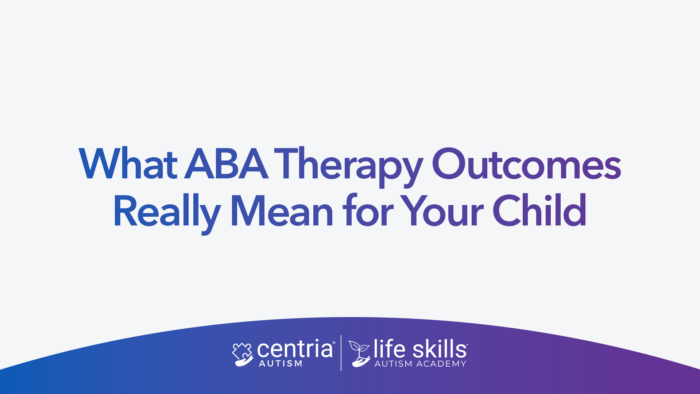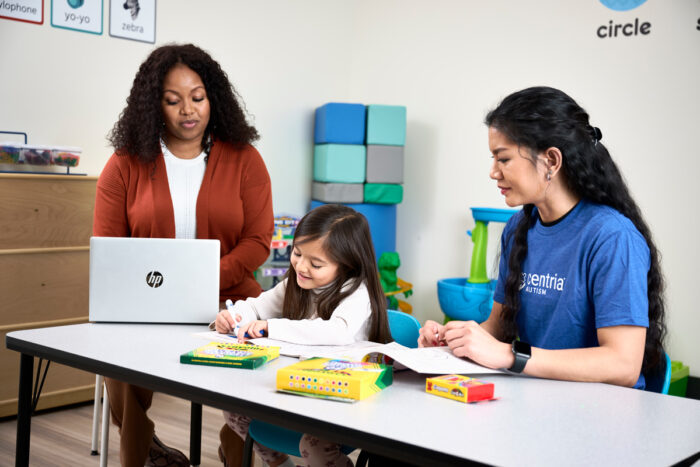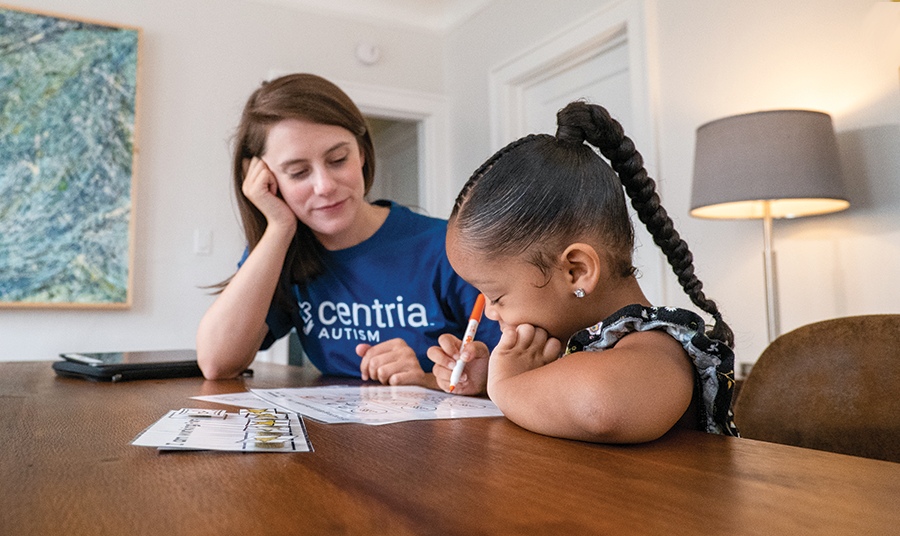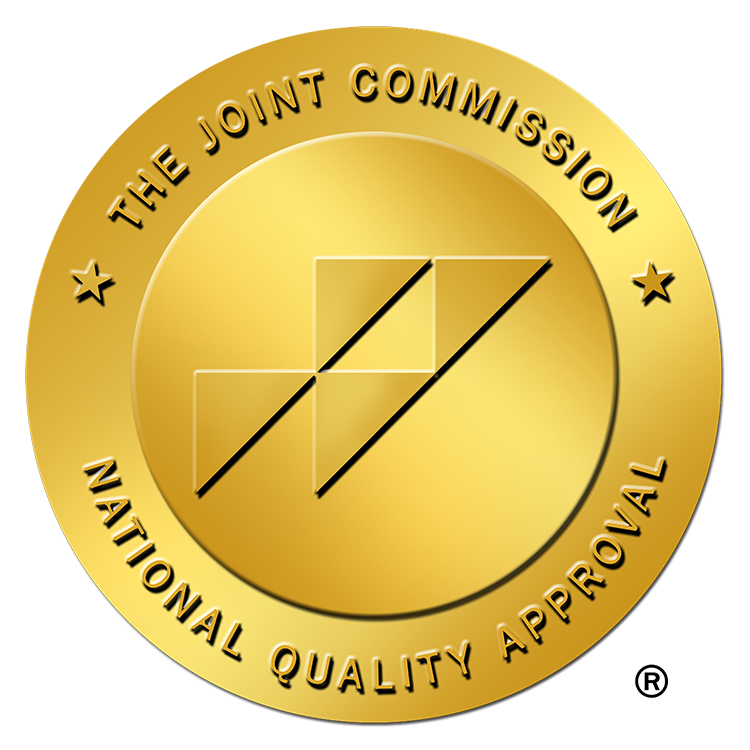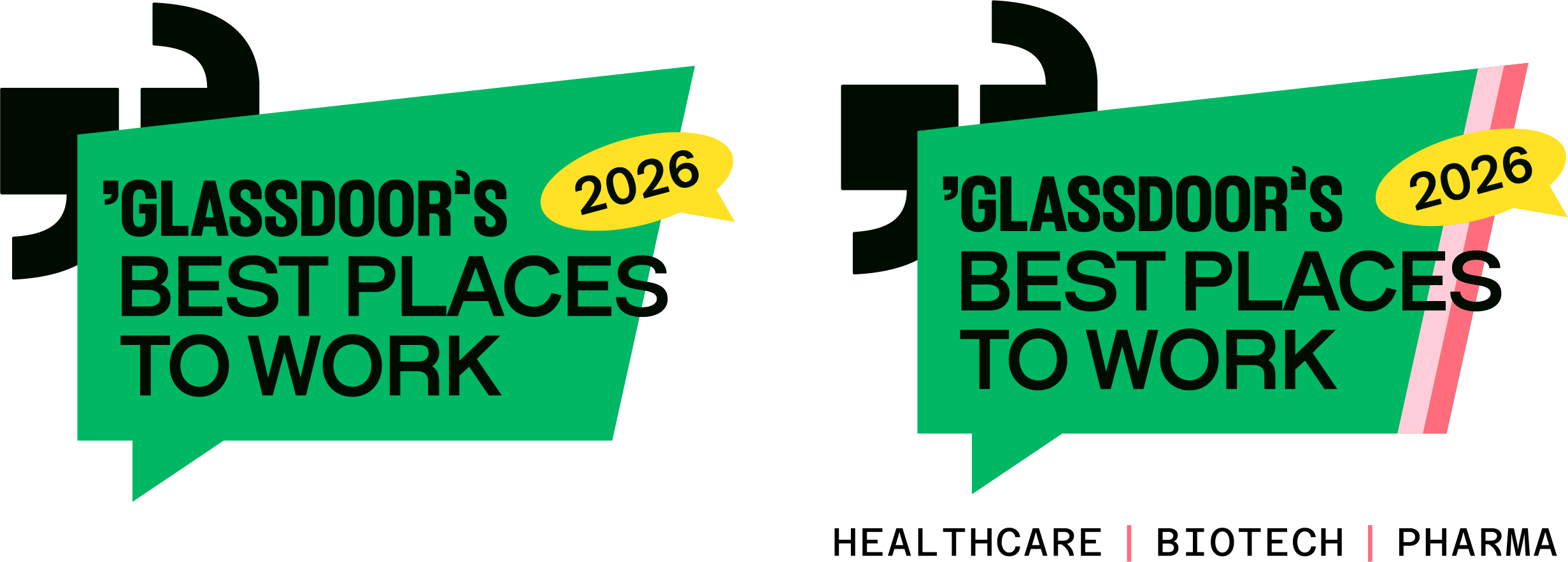Was your child recently recommended for Applied Behavior Analysis (ABA) services? Is this a new term to you and your family and are not quite sure what to expect? You are not alone.
Most families at the beginning of their journey into ABA services have questions around what to expect during service delivery. Who will I be meeting with, and when? What will happen during these appointments? Who will be working with my child? How will I be involved in my child’s treatment? This article will walk you through each phase of the process at Centria to provide answers to these questions and more!
Phases of Centria’s ABA Service Model

Phase I: Initial Assessment
Your child will be assigned a Supervising Clinician (SC). This SC has received extensive training and education in ABA and more often than not holds a special certification or license documenting such (e.g., BCBA – Board Certified Behavior Analyst; LBA – Licensed Behavior Analyst). After this assignment, your SC will conduct an initial assessment that consists of several components:
- Reviewing submitted records (e.g., past diagnoses reports, school reports, etc.)
- Directly observe your child (e.g., see how they respond to certain situations)
- Conduct an assessment interview to identify your child’s current level of performance on various skills in relation to their peers (e.g., Vineland Adaptive Behavior Scales – 3)
- In some cases, complete an additional skills assessment or behavior assessment (e.g., Verbal Behavior Milestones Assessment and Placement Program)
The purpose of this initial assessment phase is to establish a baseline from which your child can learn new, valuable skills. During this phase, your SC evaluates your child’s ability to do a variety of things (e.g., communication, routines, play skills) and uses the information gained during the assessment to recommend what to focus on during their time at Centria. They will involve you during this stage by asking you several questions regarding not only your child’s current skill levels, but also your wishes for your child, primary concerns, and priorities for treatment. Your SC will work with you to coordinate the initial assessment: this usually takes 2-3 hours and can occur across 1-3 meetings, either at your home, in our center, or via Telehealth.
Phase II: Treatment Plan Development & Authorization
Your SC takes all of the data from Phase 1 (the assessment) and creates an individualized treatment plan.
The treatment plan includes a lot of crucial information including focused areas of intervention (e.g., goals), how many hours are needed to fulfill those goals (treatment dosage), and how those hours are distributed across the week. Further, the SC notates how often they will need to meet with you to provide support and collaborate on the listed goals to ensure success across the board.
They then review the treatment plan with you and ensure that everyone is in agreement regarding how to best proceed with treatment. This is your time to discuss the treatment plan and make changes – so be sure to let your voice be heard!
Once the entire care team (you, the SC, your child, etc.) agree upon the contents of the plan, it is submitted to your insurance company or other funding source to secure authorization to move forward with services. At the same time, your Field Staff Manager or Operations Director will work with you to schedule your child’s direct therapy sessions.
Phase III: Service Delivery
Hooray! Your treatment plan was approved and services have been authorized! What’s next?
- Direct Therapy Sessions
- Your child is assigned one or a few people who work with them daily on their goals in a playful setting. These are called Behavior Technicians (BTs). Your BT(s) will take data on these goals on an iPad so that your child’s progress is objectively evaluated over time. These sessions will take place either at the center or at home, depending on the service setting options in your service area and the most appropriate environment where these skills should be addressed.
- Supervision Sessions
- But what about your SC? Do they interact with your child? YES! Your SC overlaps with your BT(s) regularly to observe how well services are going. They are specifically looking to make sure their way of teaching your child’s goals is effective and efficient. If it isn’t, they make an immediate change to ensure your child’s success. These changes can be related to what is taught, how it is taught, and reinforcement in the BT’s connection with your child. Your Supervising Clinician will overlap with your Behavior Technician on a regular basis during a direct therapy session to review your child’s recent progress, observe current programming, try out new programming, and provide support your child and the Behavior Technician as they build new skills and progress toward meeting treatment plan goals.
- Family Engagement Sessions
- We can’t do it alone! Research indicates you will see better gains by being an active participant in your child’s services. This involves meeting with your SC regularly (e.g., weekly, bi-weekly, or monthly) to select and address high-priority goals you’d like to work on as a family unit. These sessions will take place either at the center, at home, or via Telehealth, and your child may or may not be present during these sessions (depending on the nature of your goals). During these sessions, you get to update your SC on any changes (e.g., school, medical, priorities), receive coaching and modeling on ABA-related techniques you can use at home, and collaborate through strategies to address challenging situations.
Phase IV: Re-assessment & Treatment Plan Updating
Toward the end of each authorization cycle (usually every six months), the reassessment process occurs. At this time, your SC will:
- Re-assess some of your child’s skills
- Evaluate progress made throughout the authorization cycle
- Create new goals for the upcoming treatment authorization cycle
- Update your child’s treatment plan, and
- Submit the treatment plan to your insurance company or other funding source to secure authorization to continue with services.
The reassessment phase looks very similar to the initial assessment phase, but includes a report about the progress your child made on the goals previously addressed in the initial treatment plan. The reassessment usually takes less time to complete compared to the initial assessment, as your SC has had several months to get to know your child, your family, and your treatment priorities. Your input is valuable to guide selected goals for your updated treatment plan!
While some of these duties can occur during previously-scheduled supervision sessions or family engagement sessions, your SC may need to schedule additional sessions with you to ensure that these important steps are completed.
Repeat Phases
At the end of this phase, your SC will recommend to either continue with treatment, move toward graduation, or transition to services that may better meet your child’s needs. If you continue with services, your team will return to the service delivery phase and will repeat this cycle until your child is ready to either graduate from services or transition to a different type of service delivery. If your child is ready to transition to another service or graduate from services, you will move to the next phase.
Phase V: Transition/Graduation
Exciting times are ahead – your child is completing their journey with Centria and is ready to move on to a new chapter!
Transition to another service
After working through their treatment goals with Centria, many children reach a point in their journey where another related service may better fit their needs. While options are too lengthy to list here, an example would be when a child improves their fundamental language and communication skills through their treatment with us, achieves their goals, and now would benefit more from support with social skills in a group setting. During any transition, your SC works closely with you to create a transition plan and coordinates with other providers to ensure a smooth transition between Centria and their next provider.
Graduation
Time to celebrate! Graduation occurs when your child has met all of their desired treatment goals and is ready to either receive services in a less restrictive environment, or have their needs predominately met in a general education school environment. This does not necessarily imply that they will no longer receive services provided by their school or other related providers, but rather that their needs are no longer met through intensive ABA services.
Regardless of where you may be on your journey – whether considering if ABA services are right for your family, exploring treatment options, or currently involved with treatment with us or another provider, please know that Centria is here to help answer any questions you may have.
About the Author
This blog was written by Holly Almon, M.S., BCBA, LBA. Holly has worked in the field of behavior analysis since 1996, developing extensive expertise in applied behavior analysis, precision teaching, clinical decision-making, family systems intervention, systems thinking, and performance and process improvement. Her professional experience includes a strong focus on assent-based practices and collaborative work with families. Throughout her career, she has benefited from mentorship and coaching from leading experts in the field, which has helped shape her practice and leadership approach.
In her current role as Director of Clinical Development and Performance at Centria, Holly applies performance improvement and organizational behavior management (OBM) principles to build infrastructure and design and implement sustainable systems to enhance clinical quality and staff performance. Her work is centered on driving meaningful outcomes through evidence-based practices, collaborative engagement, and accomplishment-focused performance strategies.

